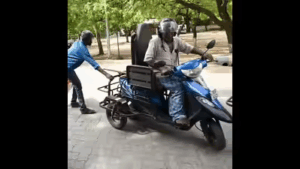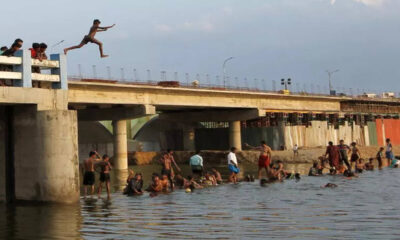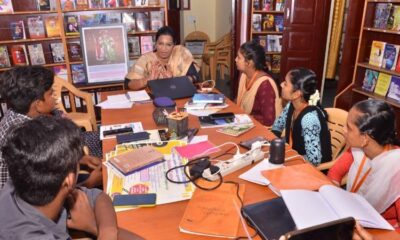Local News
“Potholes and Barriers: Madurai’s Wheelchair Users Face Daily Health Risks”
Madurai’s Wheelchair Users Struggle Amid Neglected Road Infrastructure
In Madurai, everyday road conditions pose a silent but serious health threat to individuals using wheelchairs—particularly those who have sustained spinal cord injuries. For people like Velmurugan N., the city’s roads are more than just bumpy; they represent a daily battle for safety and dignity
A Daily Hazard for Delivery Workers
Velmurugan works as a delivery agent, using a motorized wheelchair to navigate neighborhoods like Anna Nagar, KK Nagar, and Mattuthavani. These routes, marred by potholes and uneven surfaces, become especially treacherous when it rains. “Anyone who’s experienced backache knows how even small bumps matter—imagine navigating that in a wheelchair after a spinal injury,” he shared, highlighting the amplified danger for himself and others in similar conditions

On World Spinal Cord Injury Day, Velmurugan and 34 members of the Spinal Injured Persons Association organized a rally that began at the district collectorate. Their goal: to bring much-needed attention to how Madurai’s crumbling roads are compromising the health and livelihood of its residents with disabilities
W. Rajamoorthy, an executive committee member of the association, emphasized that wheelchair users—many of whom rely on gig work or deliveries to support themselves—face formidable hurdles due to poorly maintained main and diversion roads. Without safe, dependable pathways, performing even basic tasks becomes fraught with risk
Public Infrastructure Fails to Meet Needs
It’s not just the roads that are inaccessible; the city’s public facilities frequently fail to accommodate individuals with mobility challenges. Rajamoorthy pointed out that he’d never been able to use a single public toilet in Madurai that was designed for wheelchair access. He went further—highlighting a broader lack of inclusive infrastructure such as ramps and accessible halls for gatherings or public meetings.
He described scenarios where, during public events or meetings, wheelchair users must depend on others to lift them from their chairs—a glaring reminder of just how exclusive these spaces remain
Elevated Physical Risks
Orthopaedic surgeon Dr. Thanappan N. weighed in on the potential dangers these poor conditions present. He warned that even a minor skid or fall—especially without proper protective gear like helmets—can result in serious neck injuries for those with spinal impairments. Add uneven surfaces to the equation, and the stakes become infinitely higher, affecting both physical health and overall well-being
Civic Response Lags But Shows Glimmer of Hope
Civic officials have acknowledged the problem—at least in part. A. Amardeep, assistant engineer with the Madurai Corporation, admitted there is no dedicated funding line for pothole repairs; yet he affirmed that such hazards are periodically identified and addressed. The stretches highlighted by the activists, he said, would be formally notified for action and subsequent repair
While this response is a start, the absence of sustained investment in disability-friendly infrastructure makes tangible progress a distant goal.
Summary: The Crippling Cost of Neglect
Road Conditions: Decrepit, rain-worsened roads jeopardize both safety and freedom of movement for wheelchair users.
Workplace Impact: Delivery agents with mobility limitations confront cascading challenges—loss of income, risk of injury, and emotional stress.
Infrastructure Gaps: The glaring absence of public amenities—like accessible toilets, ramps, and gathering spaces—underscores systemic exclusion.
Health Risks: Medical experts note how poor pavement can translate into serious physical harm, especially for individuals with existing spinal injuries.
Municipal Response: Civic acknowledgment of the issue shows promise, but consistent and inclusive infrastructure updates remain lacking.
Moving Forward
For Madurai to uphold the rights and well-being of all residents, immediate and sustained interventions are essential. These include:
Targeted Road Repairs: Especially on routes frequently used by wheelchair-dependent delivery workers.
Funding for Accessibility Upgrades: Dedicated budgets for ramps, smooth pedestrian pathways, and accessible public facilities.
Inclusive Urban Planning: Viewing disability accessibility as central—not peripheral—to civic infrastructure development.
Policy Advocacy and Oversight: Ensuring accountability at civic and administrative levels to deliver meaningful progress.





